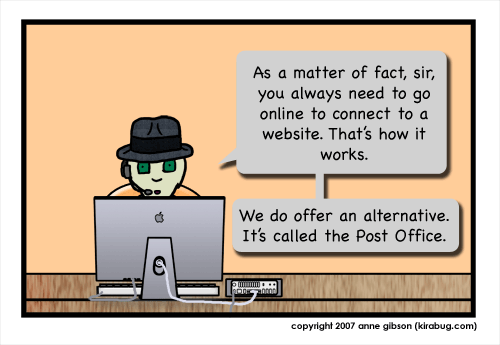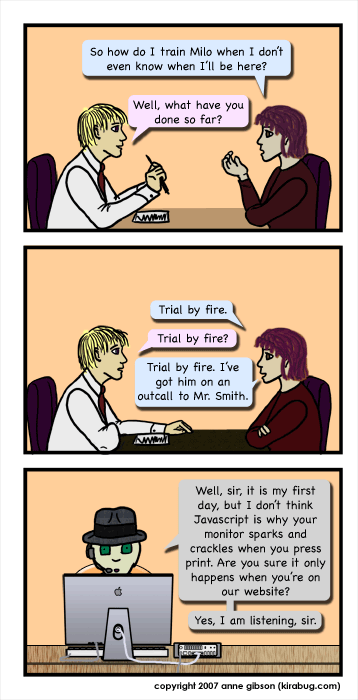This is a long musing on the basic understanding that people have about computers.
It started when I read an article (“Chrome for Clunkers”: Google’s ingenious plan to spruce up outdated versions of Internet Explorer..) sent to me by someone in the tech support department at work — the same tech support department where I worked for 7 years.
Included with this article is this very interesting video…. which explains why I am a pain in the ass about having technology that works on our clients’ machines, whether they know it or not.
Now let’s say I’m one of the folks from the video you just watched. I’m “not computer savvy”. “I’m not a computer person.” I probably know that the internet is connected to my computer and that web pages are on the internet. I probably have heard of Google, Internet Explorer, Microsoft, Apple, Yahoo, and a couple of other computer or internet related terms. When asked what browser I’m using, I might answer “Google”, “Yahoo”, Outlook”, or my personal favorites “Office” or “Word”. (Yes, when working tech support I did in fact get these answers regularly, or worse. I know I’m dating myself here, but no, “Pentium” is not your web browser either.) In really bad scary cases, when asked what operating system I run, I’ll answer “Dell”.
Hopefully, I understand what a “program” or an “application” is, probably because I have to go to my Applications folder to double-click an application. If I work in an office, there’s a better chance that I’m more computer-savvy than I think I am — I know what Word is, and how to run it, how to switch to other applications, and that new applications or updates require you to install them. But I can’t clear my cache (or even tell you what it is) without help, and even when I do know how I don’t always know why, I know that the tech support guy at [name company here] told me to do it. I probably know I have an internet service provider because I pay them, but I might not know what kind of internet connection I have. I’m not really sure where my computer ends and the Internet starts, unless it’s not working, and then I can tell because my computer ends where the error messages start.
I’m a firm believer in computer-voodoo. The last time I had X problem I cleared the cache, and it worked, even though the problem was with Word recognizing my printer. So I do it every time. I always close the windows in a certain order because one time I didn’t and the computer crashed and it took me three days to get it running again. I don’t let anyone on the home phone when I’m on the internet, even though my ISP is a cable provider, because 3 years ago when we were on dial-up it didn’t work, and a few weeks ago Susie answered the phone while I was online and the computer caught a virus.
If I knew the answer to the question, “what is a web browser?” I wouldn’t need to ask. But the Internet knows everything, so I’d open my web browser by clicking the blue E and type “what is a web browser” into a search field.
If I’m using Yahoo, I get 2 sponsored links by Microsoft for downloading Internet Explorer 8 (that don’t explain what a web browser is), 2 sponsored links by companies trying to fix my web browser (that don’t explain what it is), and then an article by Wikipedia that is so text-dense and jargon-heavy that you need a grade 12 reading level to slog through (according to MS Word’s Flesch scale, anyway). So we’ll grade that as “not useful”.
Next up: this beast, where the content is useful (assuming you know what the world wide web is and why you’d want to translate it from code) but the layout and the absolute vomit of text on the screen are so bad that I couldn’t slog through it without using Readability. We’ll grade that “mostly helpful” if I have the patience to digest ye olde wall o text, but it does nothing to tell me my next most natural question: what is my web browser?
And finally (because I couldn’t torture myself much longer), there’s this article by About, which once again assumes you know what the Web, but at least doesn’t make things worse by adding a bunch of jargon, at least for a few paragraphs.
Switch to Bing… and I found mostly links to places to download web browsers (all of which assume you know what one is), as well as the aforementioned article from Wikipedia. Grr.
So… switch to Google… and I found this:
http://www.whatbrowser.org/
Made by “some folks at Google”, this video at least gets to the heart of the problem — people don’t know a browser from a search engine from anything else. The 1-minute video addresses that basic misunderstanding and gives folks a leg to stand on. Finally! A+++ will watch again.
But to be honest, the whole experience made me sad.
People need, and expect, their computers to “just work”. They believe that they shouldn’t have to know how the inside of their computer functions any more than they need to know how their car’s catalytic converter functions. Yet, the level of understanding that many people have about their computers is more equivalent to understanding whether they’re driving an automatic or a stick shift, and whether satellite radio is pulling music in from outer space or there are 10,000 tiny bands stored in the trunk playing on demand.
We, as web designers, architects, developers, etc. need to produce pages that “just work”. We need them to “just work” in a cost-effective manner — we can’t spend thousands of dollars testing software that nobody’s using. And we want to move on to developing for the front edge of technology, where things are faster, more stable, more effective, and easier to use. In fact, they’re easier for us to use to develop web pages that are faster and easier for our users to use.
But we need to do something about the “I’m not a computer person” crowd — the ones that “aren’t internet savvy”, who use Internet Explorer 6 because they can’t upgrade, or they’re afraid to upgrade, or they just don’t know better. They’re standing in their own way, and they don’t even know it.
My question, and I have no answers, is how do we get normal not-using-computers-all-day people to understand their machines well enough that they’re not looking for the 10,000 bands in their trunk? How do we help people get out of their own way so their computers just work?



